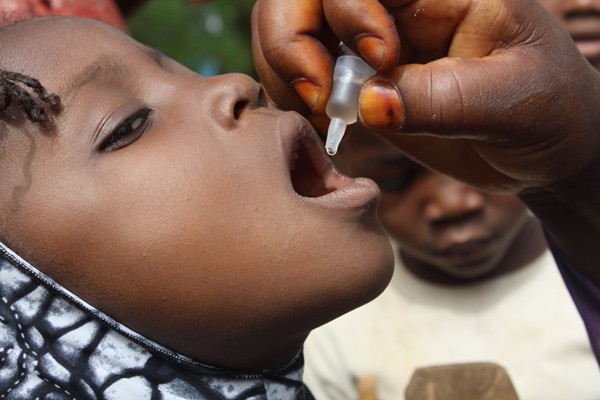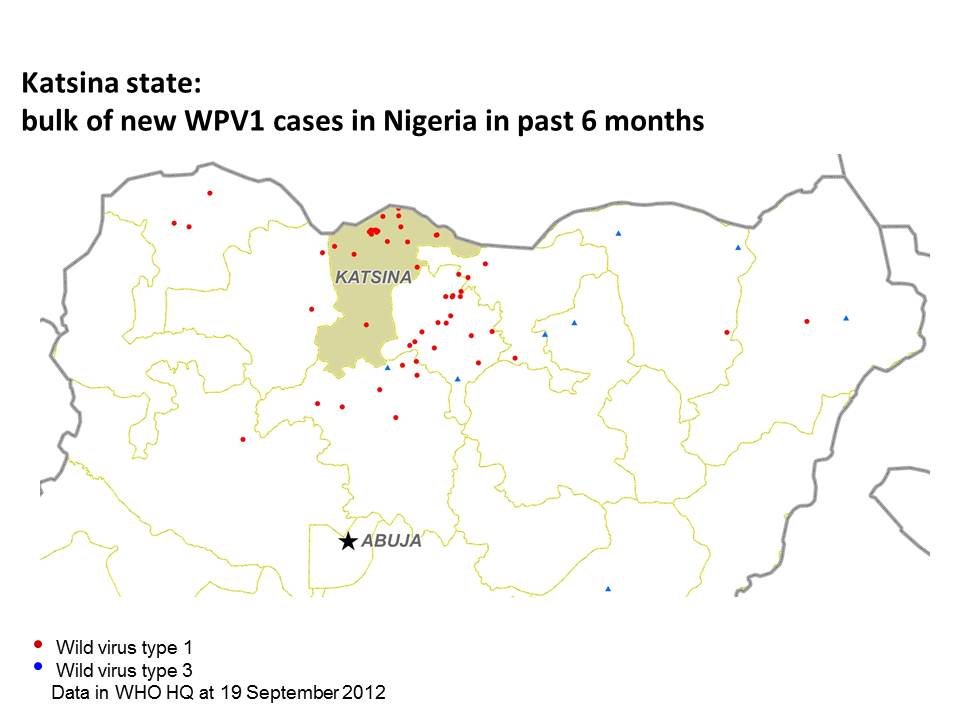
21 September 2012 – Urgent efforts are underway to stop an outbreak of wild poliovirus type 1 (WPV1) in the northern state of Katsina, Nigeria. Over the past six months, Katsina reported 18 WPV1 cases, accounting for 40% of the entire country’s WPV1 burden during that time. In addition to the impact on Nigeria’s eradication efforts, health officials are extremely concerned that the outbreak could spread across the border into neighbouring Niger.
Upwards of one-third of the state’s 1.3 million children aged less than five years are estimated to be under-immunized. During the July Immunization Plus Days (IPDs), nearly one-third of the target population was missed in Katsina city (the most populous part of the state and location of the bulk of the cases). Emergency efforts are now underway to boost population immunity levels as rapidly as possible, to curb the intense transmission of the virus in the area.
Technical capacity is being scaled up for the upcoming IPDs on 29 September to 2 October. Microplans are strengthened in line with new operational guidelines, and drawing on lessons from recently-conducted IPDs, to more accurately map populations and prepare plans for individual vaccination teams’ daily activities. Planning is focusing on integrating the scaled-up technical capacity into well-functioning units, particularly in known worst-performing Local Government Areas (LGAs). Traditional leaders are further being engaged, and targeted social mobilization increased. Tactical recommendations by surveillance medical officers (SMOs) from India, who had recently observed activities in northern Nigeria, are being fully integrated into preparations. And to reduce the risk of the virus spreading across into Niger, special border vaccination teams will be placed at and near known border crossings.
The activities will be much more closely monitored and evaluated, with field volunteers, independent monitors and supervisors concurrently monitoring individual teams while they still operate during the day. Any identified gaps in quality will then be immediately rectified by the individual teams, on the very same day. It is a significant shift in how monitoring, and subsequent implementation of necessary corrective measures, was conducted previously.
Ultimately, however, key to success will be the full and consistent engagement of the political leadership at the LGA level. To help ensure this, His Excellency the Governor of Katsina Ibrahim Shehu Shema expressed his commitment to securing stronger engagement and ownership by LGA Chairpersons, through increased accountability for operational quality.
In neighbouring Niger, activities are also gearing up to minimize the risk and consequences of potential spread from Katsina. Immunization campaigns are taking place on 22 September in key border areas, and the country will participate in a broader multi-country immunization campaign with nine other west African countries at end-October.
These measures are critical given the intense transmission in northern Nigeria, and a history of polio spread from there across the region. However, such resource intensive activities cannot be sustained indefinitely, and key to protecting the region in the long-term is to urgently finish the disease once and for all in Nigeria.




